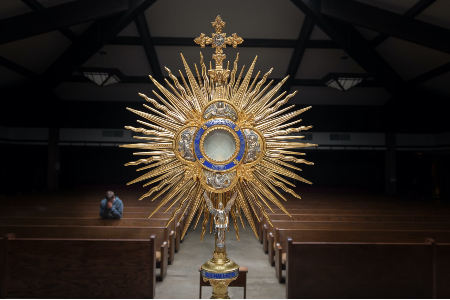
How do we know the Eucharist is the Body and Blood of Jesus Christ?
FREE Catholic Classes
Although the True Presence of Christ in the Eucharist is dogma, only a minority of Catholics accept it. How do we as Catholics know the Eucharist is real?

LOS ANGELES, CA (California Network) - The True Presence of Christ in the Eucharist is a dogma of the Catholic faith. We believe the consecrated communion wafer becomes Jesus Christ -- Body, Blood, Soul, and Divinity. One cannot truly call themselves "Catholic" without accepting this dogma. Yet, only a fraction of Catholics understand this and accept it as true.
The reasons for this are many. One is inadequate catechesis, another is a lack of belief in miracles. People naturally see the communion wafer, and they see no change to its physical form, or have any reason to believe it is changed, based on their experiences.
Without belief in the True Presence of Christ in the Eucharist, other parts of the Mass no longer make sense, such as kneeling. The reason we kneel is because Christ is physically present before us. We are kneeling before Him. But if one does not accept this belief, then kneeling feels like a pointless anachronism without justification. No wonder Catholics leave the pews.
The question is fair. How can we know that Jesus is present upon the altar?
The answer obviously involves faith, but this faith is grounded in reason. Strong logic, in fact.
When Jesus broke bread at the Last Supper, he told those gathered, in no uncertain terms, that the bread was His body. This is key to understanding the dogma. That's because Jesus cannot lie. While God is all-powerful, He cannot contradict Himself, lie, or deceive. These are not things that God does. Therefore, when Jesus declares bread to be His Body, then, it is so.
How does it become His Body? Clearly, the bread did not transform in a visual sense, but in a spiritual sense. None of the Apostles mention that the bread turned into a mass of flesh, yet they all agree that it was the Body of Christ. The Apostles understood that this was a spiritual transformation, or what we call "transubstantiation." (CCC 1376)
While the bread retains all the natural attributes of a communion waver, it is, by God's decree, the Body, Blood, Soul, and Divinity of Jesus Christ, himself. Likewise the wine, which becomes the Blood of Christ.
If one believes in Jesus, then one must also believe that He cannot lie, mislead or deceive, and therefore, one must accept as His Apostles did, that the bread does in fact become His Body. And this belief was retained by His followers after His Resurrection, and is passed on to us today.
The only argument against this is the rejection of Jesus, of His divinity, of His Truth, and of His Resurrection. In which case, such a person would be an atheist, not a Christian at all. But if you believe in Jesus, and that He is the Son of God, and was Resurrected for our salvation, then you must logically accept the True Presence of Christ in the Eucharist.
Although most Protestants do not accept this dogma, it is a tragic consequence of falling away from the Church. Protestants such the Calvinists, sought to differentiate themselves from the Church as entirely as possible, and the rejection of this truth was one way to do that. But there is no reason to think they are correct, anymore than the atheists.
One either believes and accepts the words of Jesus Christ as true, or one does not.
Join the Movement
When you sign up below, you don't just join an email list - you're joining an entire movement for Free world class Catholic education.
An Urgent Message from Sister Sara – Please Watch
- Easter / Lent
- 5 Lenten Prayers
- Ash Wednesday
- 7 Morning Prayers
- Mysteries of the Rosary
- Litany of the Bl. Virgin Mary
- Popular Saints
- Popular Prayers
- Female Saints
- Saint Feast Days by Month
- Stations of the Cross
- St. Francis of Assisi
- St. Michael the Archangel
- The Apostles' Creed
- Unfailing Prayer to St. Anthony
- Pray the Rosary
![]()
Copyright 2026 Catholic Online. All materials contained on this site, whether written, audible or visual are the exclusive property of Catholic Online and are protected under U.S. and International copyright laws, © Copyright 2026 Catholic Online. Any unauthorized use, without prior written consent of Catholic Online is strictly forbidden and prohibited.
Catholic Online is a Project of Your Catholic Voice Foundation, a Not-for-Profit Corporation. Your Catholic Voice Foundation has been granted a recognition of tax exemption under Section 501(c)(3) of the Internal Revenue Code. Federal Tax Identification Number: 81-0596847. Your gift is tax-deductible as allowed by law.






